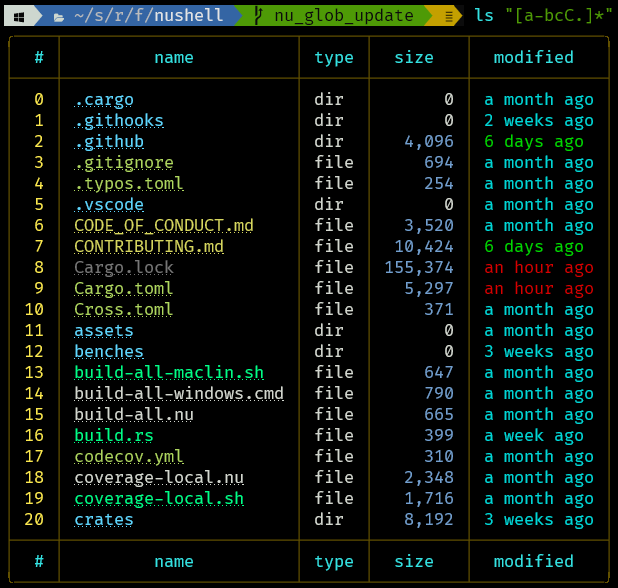forked from extern/nushell
# Description This PR updates `nu-glob` to add the latest changes and updates from `rust-lang/glob` [v0.3.1](https://github.com/rust-lang/glob). With these changes you can do this type of globbing ```rust /// - `?` matches any single character. /// /// - `*` matches any (possibly empty) sequence of characters. /// /// - `**` matches the current directory and arbitrary subdirectories. This /// sequence **must** form a single path component, so both `**a` and `b**` /// are invalid and will result in an error. A sequence of more than two /// consecutive `*` characters is also invalid. /// /// - `[...]` matches any character inside the brackets. Character sequences /// can also specify ranges of characters, as ordered by Unicode, so e.g. /// `[0-9]` specifies any character between 0 and 9 inclusive. An unclosed /// bracket is invalid. /// /// - `[!...]` is the negation of `[...]`, i.e. it matches any characters /// **not** in the brackets. /// /// - The metacharacters `?`, `*`, `[`, `]` can be matched by using brackets /// (e.g. `[?]`). When a `]` occurs immediately following `[` or `[!` then it /// is interpreted as being part of, rather then ending, the character set, so /// `]` and NOT `]` can be matched by `[]]` and `[!]]` respectively. The `-` /// character can be specified inside a character sequence pattern by placing /// it at the start or the end, e.g. `[abc-]`. ``` Example - with character sequences  Example - with character sequence negation  Example - normal globbing  Example - with character sequences  Not that, if you're using a character sequence by itself, you need to enclose it in quotes, otherwise nushell will think it's a range. But if you already have a type of a bare word already, no quotes are necessary, as in the last example. # User-Facing Changes <!-- List of all changes that impact the user experience here. This helps us keep track of breaking changes. --> # Tests + Formatting <!-- Don't forget to add tests that cover your changes. Make sure you've run and fixed any issues with these commands: - `cargo fmt --all -- --check` to check standard code formatting (`cargo fmt --all` applies these changes) - `cargo clippy --workspace -- -D warnings -D clippy::unwrap_used -A clippy::needless_collect -A clippy::result_large_err` to check that you're using the standard code style - `cargo test --workspace` to check that all tests pass - `cargo run -- crates/nu-std/tests/run.nu` to run the tests for the standard library > **Note** > from `nushell` you can also use the `toolkit` as follows > ```bash > use toolkit.nu # or use an `env_change` hook to activate it automatically > toolkit check pr > ``` --> # After Submitting <!-- If your PR had any user-facing changes, update [the documentation](https://github.com/nushell/nushell.github.io) after the PR is merged, if necessary. This will help us keep the docs up to date. --> |
||
|---|---|---|
| .. | ||
| src | ||
| Cargo.toml | ||
| LICENSE-APACHE | ||
| LICENSE-MIT | ||
| README.md | ||
nu-glob
Support for matching file paths against Unix shell style patterns.
Usage
To use nu-glob, add this to your Cargo.toml:
[dependencies]
nu-glob = "0.60.0"
Examples
Print all jpg files in /media/ and all of its subdirectories.
use nu_nu_glob::glob;
for entry in glob("/media/**/*.jpg").expect("Failed to read glob pattern") {
match entry {
Ok(path) => println!("{:?}", path.display()),
Err(e) => println!("{:?}", e),
}
}